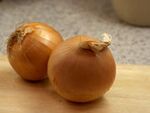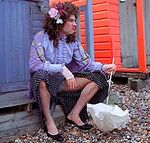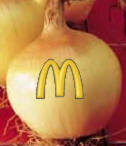Onion
For the wise-ass Spanish-language rarely-hyphenated mega-tabloid, see La-Cebolla
“My Onion was glass. Ha! In your face Paul!”
Onions (classification: allieum weepa) is a pungent and curvy sweet white pulp-orbital commonly found in orchards and in vineyards. It is used mainly as a cosmetic or for food preparation; and sometimes a weapon by those of the Yalla Marca tribes in Southern Italy and in Eastern Siberia. Onions are the only plants without seeds and therefore mate with other onions on contact. Onions where first used by famous outdoor catering pioneer Mike Christ, brother of TV's Jesus H Christ. He claims to have invented them accidentally while searching for a cure for The Gout.
Life cycle[edit]
Onions come in two types; tree and vine. The Tree Onions and the Vine Onions both have similar birth and mating rituals. The only major differences being their habitat and use by humans; Tree Onions dwell mainly in the lower fronds of weeping willows and are used for cosmetic purposes, Vine Onions are found in the wilds of gnome clearings or grown in vineyards for edible and alcoholic reasons.
Birth[edit]
Onions are always born in threes, but sometimes in Brandon Vickers, held slightly separate from each other by the branch or vine upon which they are born. However as the branch or vine begins to sag due to age, bringing the onions closer, the third onion always suffers a lamentable fate as the other two onions rise up and attack it. The pitiable creature is severed from the branch and drops to its death several hundred feet below ground.
From then on, the third onion is always referred to as an Anion and all mention of it is banned from all polite conversations. Chemistry and electrolysis are both equally taboo subjects, as is the mention of fluffy pink handcuffs.
Mating[edit]
The two remaining onions are thus paired for life. Reproduction occurs through simply coming into contact with the other onion, which is why a basketful of the vegetables is sometimes called 'an orgy of onions'. It has been scientifically proven that onions are also the only plant able to experience pleasure in mating, so walking through an orchard or vineyard of onion plants can sometimes be a highly sensual or even erotic experience as you pass by rows and rows of onion pairs just touching each other.
Those who harvest onions are more virile than the harvesters of other vegetables.
Death[edit]
The onion only truly dies upon separation from other onionkind. Upon separation from its mate, the onion, still alive, begins to weep pungent tears into itself and soon becomes heavy with emotion. This emotion leaks invisibly into the soil and begins a new generation of onions, but the parent onion is not present to witness the birth, growth and ecstasy of its children. Instead, it is carted off to various places and used as a cosmetic, as food or as various other items so beneficial to mankind.
Thus, when you cut open the onion, the pungent smell produced is the onion's sorrow at being parted from its beloved. Emotion is stored deep within the pores of the grieving onion and because of this, anyone else in the room with it will weep also when cutting it open, touched subconsciously by the deep romance and tragedy of it. Thus it is that the onion is truly a tragic figure in life, in death and in batter.
Suicide[edit]
In recent times the onion population has been decimated in self-caused horrifying ways. Suicide is the leading cause of death, and nearly 7/10 onions commit suicide within the first year of their life. What do they have to look forward to? "a life without a reptile is not life at all" says Joe Onion, the leading onion activist. If an onion you know is showing signs of depression then do the right thing and help that onion seek out support.
Uses[edit]
Cosmetics[edit]
By far the most important use of an onion is as a cosmetic. There are entire brands of cosmetics based on onions, based around the noble sorrow the perfume gives to the wearer. Ranges of lipstick are also created for this purpose- 'My Pungent Pearly Love', 'Weeping Onion-Red Romance', 'Allium's Sweet Pink Sorrow' and 'Exotic Sunny Onion Kiss' being just a few names. Perfumes and colognes of onion origin are also prevalent, and it is not uncommon for a fashionable lady to say to her companion, "Darling, you smell like Onions. It's so delightful! It's such a pervasive, nasally-offensive odour! I really must get the brand from you!"
There is even eyeliner and mascara with onions as a base ingredient. The customers of this product are usually Goths, Emo, sadists or those who enjoy the watery, Leaking-Black-Ink look and the accompanying Bloodshot-Eye appearance.
Alcoholism[edit]
Vine Onions are not just prized for having the deepest, most sodden grease stains out of all the allium family. Unlike Tree Onions, Vine Onions can be fermented and distilled into a highly alcoholic liquid through a process known as Onionpressing. The liqueur produced is highly potent and in its unbottled state has been known to force plants, insects and small animals into committing instant, fatalistic suicide with its sorrow-inducing toxins. Bottled, however, Onion Wine is known to be a mild and temperate drink, suitable for all ages to enjoy. The unique flavour causes only the most sensitive to weep, although pregnant and nursing mothers are warned to abstain for fear that their milk may become cream-cheese-and-onion-flavoured in the process.
Infants below the age of negative two months are also cautioned, for scientific research has shown that alcohol damages their unformed appendixes. The appendix is an organ in the human body expressly created to process the formidable alcoholic content of Onion Wine, for the liver cannot cope with the extreme toxicity of onions for more than a week. However many pre-natal infants do not listen and as a result, once born, their appendixes are useless and serve no purpose whatsoever in the body due to their early murder.
Food production[edit]
Onions are sometimes used in food production, preparation and presentation. The most common use is of course as a napkin ring, where the onion rings are deep-fried in batter and wrapped around a napkin in order to leave that utterly chic grease stain around one's napkin. Other uses include as toothpick holders, as flavour-enhancers for gum, as a modern form of appetiser (wrapped around a pickle and skewered with a sliver of bacon) and even as a hair accessory to wear only at the dining table. The actual edibility of the onion is debatable and the eating of it is only when strictly necessary, and never when in polite company.
Weaponry[edit]
Lastly, onions are used as weapons by the Yalla Marca tribe in Southern Italy. The Yalla Marca, despite residing in Southern Italy, are actually Chinese-Malay in nationality although they also claim New Zealand ancestry. This explains their ability to consume said onions after using them to bludgeon their enemies to death. Onions, however, are seen as versatile instruments by the Yalla Marca, not just as clubs to hit people over the head with. They can be frozen solid and then sharpened on a whetstone and used to run people through; they can be cut into chunks and melted into a highly toxic poison with a list of secret ingredients added which are, to the Yalla Marca's victims, 'finger lickin' good'; they can even be deep-fried whole and used as a cattle-prod to torture captured enemies into submission.
Other Uses[edit]
Onions formed an early component in initial prototypes of the Catalytic converter, and can be used to induce excessive depression in young boys who listen to "emo" music. This particular outcome can be achieved by placing freshly-sliced onions in their sorrowful eyes. Also shown to affect those who do not listen to "emo".
The Onion in Culture[edit]
Plays[edit]
Several plays have been written about the romance, the tragedy and the separation of Onions. Most of them, however, have had humans substituted for the onion protagonists, for fear that mankind would misinterpret the fiery passion the onion pairs have for each other, just because onions are falsely said by humans to be non-sentient. Such a one is 'Romeo and Juliet', in which two lovers are separated by their feuding families and die tragically. The real play was of two Vine Anions from different vines who somehow came into glorious, blissful contact, spending hours together in reproductive ecstasy. However since they were Anions, the onion pairs from both vines objected and severed both from their height. Both fell to their deaths, crying defiantly that love would last beyond fertiliser, beyond compost and beyond the dangerous bounds of the harvester's basket. It was a scandalous play indeed, and suffered much in its translation into human terms, losing much of the beauty along the way.
Language[edit]
Onion is in popular culture used to signify an object, usually in a negative context. Phrases such as "Bring me the head of that onion," or "Die, you onion!" are common examples of its usage. In prison slang, an "onion" signifies a person willing to engage in sexual intercourse with the guard dogs. A clueless politician "knows his onions" but in reality he thinks an onion is a type of garlic sausage.
Literature[edit]
There are many lovely novels and several free-verse poems on the Joy of Onion. There is 'The Onions of Wrath', for instance, by John Steinbeck; 'Brave New Onion', a futuristic tale of the onion in a permissive and totally consumeristic society; 'Onion Farm' by George Orwell; 'The Love Song of J. Allium Prufrock', a beautiful poem by T.S. Eliot; and 'The Happy Anion' in which the Happy Anion's finery is slowly peeled apart, piece by piece, by his friend the Worker Ant, to be given to poor people without sufficient funding for cosmetic treatment.
Music[edit]
The amount of musicals and songs written are stupendous. The amount of musicals and songs written about the onion are less stupendous, for it is here, in the realm of music, that the onion is not so adored. Composers complain that the only word they can make onion rhyme with is 'bunion', and they state that both are terribly unromantic words. "The word 'onion' is just not evocative of romance and beauty," one famous composer is said to have said. This composer knows nothing and is truthfully talentless. After all, it was he who wrote 'Twinkle Twinkle Little Star' at the age of five. He should have been run through at birth by a Yalla Marca for creating the heinous thing. Children have been permanently scarred by it.
Wild[edit]
Wild onions are considered the most dangerous of the elephant family, having been reported to kill over 70 people in one sitting. Though wild onions are nothing more then the hellish offspring of a Calculus Book and a Bag of Herr's Potato Chips, they are to be approached with extreme caution. If ever conered by one, their one weakness is Penguin sperm, which is way many Onion Biologists keep a ready supply of penguins in their freezer. Wild Onion hides go for over 40gold on the Red Market. It is rumored that the blood of the wild onion can cure various diseases; including AIDS and Cancer.
See Also[edit]
| ||||||||||||||||
| |||||||||||||||||||||||||||||||||||||




